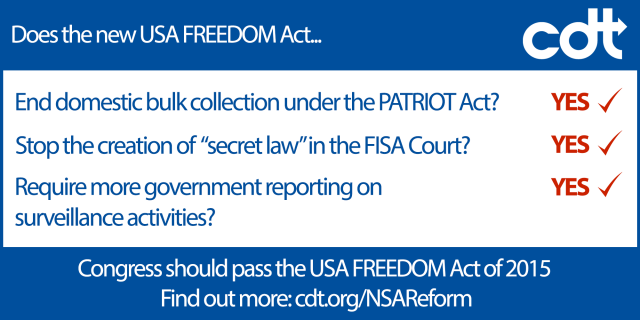Congress Should Pass USA FREEDOM Act of 2015
Today Members of both the House and Senate introduced new versions of the USA FREEDOM Act to end the NSA’s bulk collection of Americans’ communications records. The Center for Democracy & Technology (CDT) supports this bill and considers it a significant first step in broader government surveillance reform. CDT believes the bill provides a more concrete reform than simply allowing Section 215 of the PATRIOT Act to expire in June 2015. However, even with passage, there would still be much more work to done to enhance privacy protections from overbroad government surveillance.
“The USA FREEDOM Act of 2015 offers an effective path forward in reforming overbroad domestic surveillance and putting an end to the bulk collection of Americans’ communications,” said CDT President Nuala O’Connor. “With Section 215 of the PATRIOT Act soon to expire, Congress should move quickly to pass this legislation – without weakening it – to protect Americans’ privacy while preserving national security. It’s time for Congress to finally prove it’s serious about stopping the overly invasive programs that infringe upon the privacy of innocent Americans.”
The bill would end the NSA’s ongoing bulk collection of domestic phone records and prevent the government from establishing new bulk collection programs under several other authorities. The bill would also provide greater transparency and accountability regarding surveillance orders and the activities of the secretive Foreign Intelligence Surveillance Court. These advances would be less certain if Section 215 of the PATRIOT Act was allowed to sunset, since the government can currently conduct bulk collection programs under other laws besides Section 215.
“When it comes to ending domestic bulk collection, this new version of the USA FREEDOM Act is clearly superior to the bill that passed the House of Representatives in 2014,” said CDT Advocacy Director and Senior Counsel Harley Geiger. “The PATRIOT Act has been misappropriated for mass collection of Americans’ sensitive information for too long, without any tangible benefit to security. Congress should not wait any longer to decisively rein in these egregious practices.”
See CDT’s Chart Comparing the 2015 USA FREEDOM Act with the 2014 versions.
The USA FREEDOM Act of 2015 is not as comprehensive as CDT would prefer, and leaves several problems unaddressed. Notably, the bill omits an important provision that was present in the version Sen. Leahy introduced in 2014. The Senate 2014 bill – which CDT supported, but which failed to proceed in the Senate – would have required the government to limit the retention of information about individuals with no connection to a suspect or foreign power. This “enhanced minimization” language would have helped mitigate privacy problems raised by surveillance that is not “bulk collection.” In addition, the new bill’s transparency provisions require scant reporting on surveillance conducted under Sec. 702 of FISA.
“CDT supports the USA FREEDOM Act of 2015, though we hope Congress improves it – particularly by requiring the government to destroy data collected about innocent people and strengthening transparency,” added CDT’s Geiger. “Congress should view passage of this bill as an important first step towards critical reform, but only the first step.”



